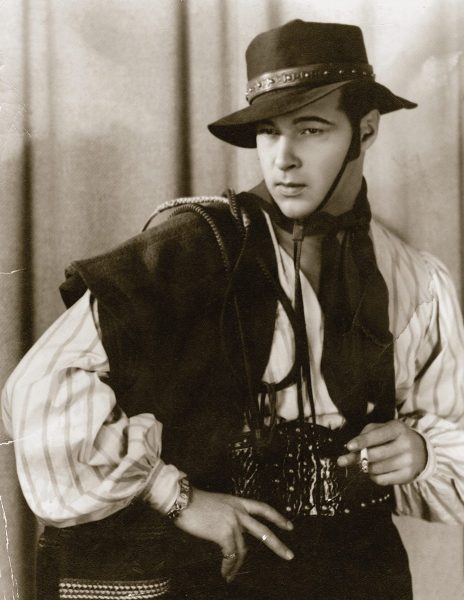STOries: Our Valentino

In 1951, St. Olaf’s very own Anthony Dexter (born Walter R. Fleischmann Jr., Class of 1935) starred in the title role of Columbia Pictures’ Valentino, a lavish Technicolor biopic of the legendary 1920s silent screen heartthrob Rudolph Valentino (1895–1926).
The road from Northfield to Hollywood started for Fleischmann in 1933, when he transferred to St. Olaf from Hebron College in Nebraska. In an interview with Photoplay magazine, Fleischmann recalled that his campus debut as an actor was purely accidental. An English major, he registered for a fall term class in play production, believing it would be a “snap.” Plus, the introverted young man figured the experience would provide him with an opportunity to socialize more freely with the young ladies.
The class prepared to present the old English morality play Everyman in November, and Fleischmann tried out for the lead role. To his surprise, he got the part. Not only did he discover that acting took real effort, it was something he enjoyed and for which he had a natural talent.
Fleischmann found himself center stage once again in Frank H. Bernard’s melodrama Silas the Chore Boy. At 5:30 on the evening of the premiere performance, one of the male cast members informed Elizabeth Walsingham Kelsey, longtime sole theater instructor and director, that he was snowbound in a town nearby and could not make it by curtain time. Kelsey immediately turned to Fleischmann, noting “I locked Walt in a room with a script, and at 8 p.m. he went on the stage, played the full part without missing a cue.”

In the following two years, Fleischmann performed in several other college productions, including Shakespeare’s The Taming of the Shrew (fall 1934). With each performance, he worked hard at honing his acting skills. College reviews described him as a “quiet, likable, unassuming young chap” whose stage presence and polished acting skills made him a natural-born performer. As a senior, Fleischmann played the title role in Bjørnson’s Sigurd Jorsalfar (spring 1935). Kelsey recollected that although Fleischmann did not speak or understand Norwegian, he memorized his lines — word-by-word with proper pronunciation — under the able coaching of two campus language experts. His performance was first-rate and nearly flawless in delivery and intonation.
Following graduation and leading up to and after his service in World War II, Fleischmann appeared in a few Broadway productions under his legally changed name of Walter Craig. He also toured with actress Mae West’s stage company. His big acting break came in 1948, when he was ‘discovered’ by Columbia Picture’s producer Edward Small after a reported 11-year search for the perfect celluloid Rudolph Valentino clone, during which time Small claimed to have made over 400 screen tests from a pool of 75,000 aspiring actors.
Upon signing the movie contract for Valentino, Small thought Fleischmann needed a more dashing professional name than Walter Craig, hence he was rebranded as Anthony Dexter. The publicity surrounding his dead-ringer looks of Rudolph Valentino proved good press, generating a thousand fan letters per week. Upon the film’s release, The Hollywood Reporter called him “the new best bet for stardom.” Photoplay magazine went even further: “If Valentino was anything like the impersonation that Anthony Dexter gave of him, no wonder every woman was mad about him! He sizzled, he smoked, he was Romance!”

Fleischmann’s rising star unfortunately fizzled when Valentino flopped at the box office, and he was reduced to appearing in B-movies and taking minor television roles in the years that followed. During the 1970s, Fleischmann, who still used the moniker Anthony Dexter, taught high school speech and drama in Los Angeles. A former student said, “He was kind of a one-hit wonder, but a heck of a nice guy and an inspiration to his students.” Fleischmann passed away in 2001 at the age of 88, in Greeley, Colorado.
Jeff Sauve is a historian and a regular contributor to St. Olaf Magazine. This story and similar entertaining stories by Sauve have recently been published by St. Olaf College in St. Olaf Theater: A Centennial Celebration, 1921–2021. The book is currently available at byallmeansgraphics.com and in Northfield at By All Means Graphics, 17 Bridge Square.